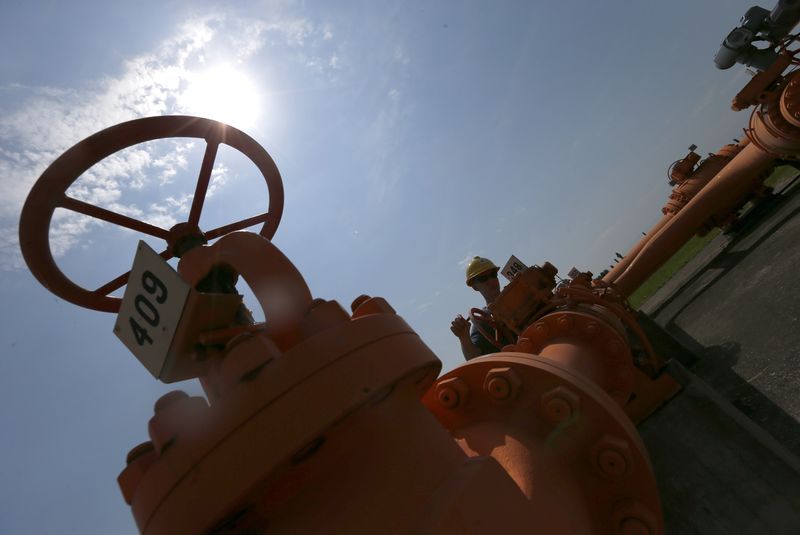Fubotv earnings beat by $0.10, revenue topped estimates
(Bloomberg) -- Liquefied natural gas prices are poised to test record lows this year thanks to an onslaught of new supply and warmer winter temperatures curbing consumption.
The startup of new export projects from Australia to the U.S. has flooded the market, while brimming stockpiles in Europe and an expected slowdown in Chinese demand have dumped cold water on consumption prospects. LNG for spot delivery to North Asia is on track to hit an all-time low this summer, while gas prices in Europe and the U.S. are trading at the weakest seasonal levels since 1999.
“The global oversupply of LNG has been building and building and building,” said Ron Ozer, founder of gas-focused hedge fund Statar Capital LLC in New York. “The gas market can’t stomach the oversupply and warm weather, and it’s getting both.”
This is what the rock-bottom prices mean for the industry:
American Halt
U.S. gas exports have surged amid the nation’s shale boom, but plummeting prices may now throttle back shipments or encourage sustained maintenance while firms weather the storm. Producers and companies with offtake agreements may decide not to load cargoes because prices are too low to earn a profit after accounting for shipping costs.
With cargoes from the Gulf of Mexico currently priced around $2.65 per million Btu, cash margins are positive only because of weak U.S. benchmark prices, according to Robert Sims, an analyst at Wood Mackenzie Ltd. There’s a chance that production could be reduced if the spread between benchmark Henry Hub and U.S. Gulf LNG narrows 25 cents, he said. Torbjorn Tornqvist, chief executive officer of Gunvor Group Ltd., the biggest independent LNG trader, sees the market about 50 cents away from shut downs.
“I think we can see even lower prices in the next few months,” Tornqvist said in an interview this week in Davos. “The supply and demand balance doesn’t look good.”
Contract Scrutiny
Buyers may demand revisions to long-term supply contracts, such as better pricing or the removal of restrictions on reselling cargoes. Japan’s Osaka Gas Co. has already taken action, moving an Exxon Mobil Corp (NYSE:XOM).-led LNG joint-venture to arbitration in a bid to get lower rates.
Qatar, one of the world’s biggest suppliers and traditionally the strictest when it comes to pricing, may be showing some flexibility. The supplier has started offering more competitive price links, with the lowest seen to Korea Gas at 10.8% the price of oil, according to FGE, an energy consultant. That compares to 2008, when Qatar signed contracts with Chinese firms in the 16% range.
Investment Delays
After four years of belt-tightening, the amount of investments last year in new production capacity set a record. Companies including Qatar Petroleum, Novatek PJSC and Venture Global LNG Inc. sanctioned new plants from the U.S. to Russia.
But the current wave of additional supply and persistent weak global prices is challenging new projects seeking final investment decisions, according to Morgan Stanley (NYSE:MS). The bank reduced its outlook for the number of projects reaching FID and revised lower its new supply outlook for the middle of the decade. The low price environment will also likely force Qatar to stagger or postpone its planned 64% capacity expansion, currently scheduled by 2027, according to FGE.
Profit Pain
Weak prices mean more pain for global energy majors including Total SA (PA:TOTF) and Eni SpA, who have seen profits from gas-related businesses dwindle. Some European utilities -- who face mounting criticism for their use of fossil fuels -- may decide to follow peers that are ditching LNG altogether. Denmark’s Orsted A/S cited loss-making LNG operations for its decision to sell the business to Glencore (LON:GLEN) Plc at the end of last year, while Spain’s Iberdrola (MC:IBE) SA completed its exit this month.
The Sunnier Side
Royal Dutch Shell (LON:RDSa) Plc, the biggest trader of the fuel, has been able to stave off losses on LNG through contracts linked to oil, while leveraging the weak spot market. Most long-term LNG contracts are linked to the price of crude, which puts them about twice as expensive as prompt cargoes sourced on the spot market.
The world’s biggest importers of LNG, Japan’s Jera Co. and Korea Gas Corp., will benefit from lower prices and may be encouraged to shift more of their procurement to the spot market. Jera gets about 20% on spot or via short-term contracts, which run four years of less. That compares with an average of 32% across global LNG trade. Korea Gas bought about one-quarter of its imports on a spot basis in 2018. Still, the firms’ upside is limited as they will source most of the remainder through oil-linked contracts.
India’s transition toward gas may get a boost, as the nation’s price-sensitive buyers are poised to pick up more cargoes from the spot market, Morgan Stanley (NYSE:MS) analysts said in a Jan. 16 note. Beneficiaries of the transition are gas aggregators like Gail India Ltd and Petronet LNG Ltd and city gas distributors, according to the bank.
